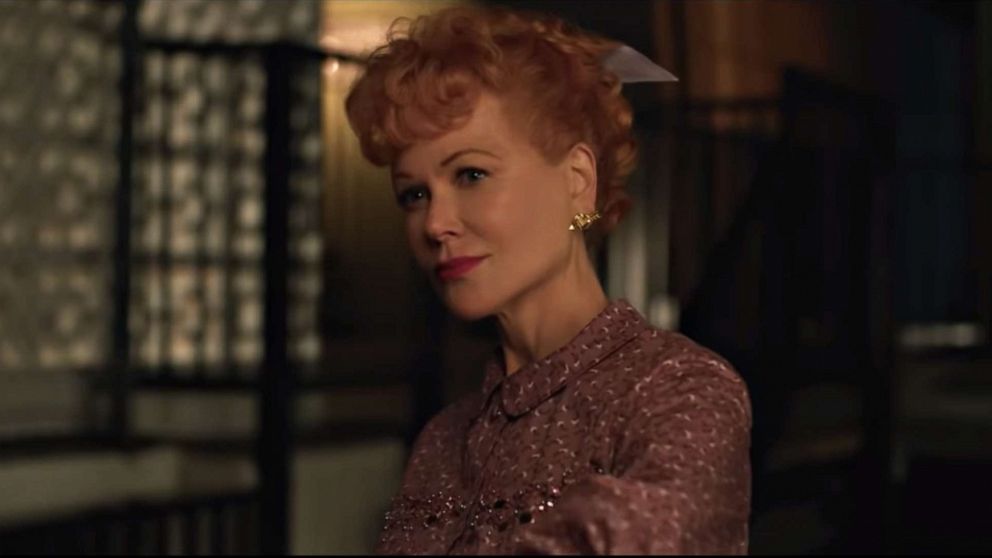
Early detractors sniffed that Nicole Kidman was all wrong to play comedy sweetheart Lucille Ball. Won't they be surprised! In "Being the Ricardos, now in theaters ahead of streaming on Amazon Prime on Dec. 21, Kidman is all-stops-out fabulous as the beloved sitcom ditz of "I Love Lucy," who off screen was way ahead of her time as a powerful and prickly feminist pioneer.
Don't mistake the astutely clever and captivating movie by writer-director Aaron Sorkin for a biopic. Except for a few pertinent flashbacks, "Being the Ricardos" takes place in 1952 during one tumultuous week of production on "I Love Lucy," the ground-breaking series that starred Ball and her Cuban husband, Desi Arnaz (Javier Bardem), as the fictional Lucy and Ricky Ricardo.
Clearly, life wasn't always a laugh for Ball and Arnaz. Not during a week when the gossips nailed Ball for being a communist (she was, on a technicality) and Arnaz for cheating on her (he did). And, oh yeah, Ball is also pregnant -- a word 1950s censors wouldn't even allow on the air.
The couple used their clout -- their show reached 60 million viewers every week -- to incorporate Ball's baby bump into the script. But the un-American charges in the days of black-list McCarthyism could crush their careers and Desilu, the business empire they built together. Full disclosure: all these things happened, just not during a single week.
MORE: 'King Richard' review: 'Will Smith gives the performance of his lifeBall and Arnaz were in danger of being one of the first victims of cancel culture, a phrase unknown in the 1950s but totally relevant in Sorkin's incisively funny screenplay. And Kidman and charmer Bardem strike sexual sparks you'll never see on reruns of "I Love Lucy," which is always streaming somewhere in the world, oblivious to time or changing fashions.
Download the all new "Popcorn With Peter Travers" podcasts on Apple Podcasts, Spotify, Tunein, Google Play Music and Stitcher.
Sorkin and his dazzling design team do a terrific job of emulating scenes from the black-and-white TV series in which Kidman pitches her voice higher to capture Lucy's comic squeak in scenes with neighbors, Fred and Ethel Mertz, played by J.K. Simmons and Nina Arianda in the classic roles originated by William Frawley and Vivian Vance, who reportedly hated each other.
Simmons is sensational playing Frawley as a commie-hating, liberal-baiting geezer whose age and testy manner irritated Vance who felt she was too young and attractive to be married off to a grandpa on the series. But Sorkin gives him a bar scene with Lucy that shows the compassion just under Frawley's thick skin. And it's heaven watching Simmons play the hell out of it.
That tension adds to the film's zesty pace, but Sorkin understandably gravitates to what went on creatively behind the scenes on "I Love Lucy" in the writers room and in private. Between sequences in which Desi drums the bongos and warbles "Babalu" and "Cuban Pete," Bardem persuades us what a trailblazer the "I" in "I Love Lucy" was as a producer and innovator.
MORE: Review: 'Licorice Pizza' one of the best films of the yearStill, it's never in doubt who runs this show. Off camera, Ball spoke with a cigarette rasp that Kidman captures perfectly. Her putdowns of a careless director or an arrogant sponsor can sting. There's a lifetime of rejection and suspicion in that voice. Ball had resigned herself to second-fiddle status in Hollywood before TV made her a legend.
The most touching moments in the film reveal Ball as more comfortable in her own skin on the "Lucy" set than she was in her own home. "I Love Lucy" was built to save a marriage that needed more than mutual passion and respect to rescue it.
Is this drama about a comedy more rat-a-tat Sorkin than the real-life Lucy and Desi? Maybe. Whether he works in movies ("The Social Network"), TV ("The Newsroom") or theater ("To Kill a Mockingbird"), Sorkin always aims higher than formula. That's worth cheering.
In "Being the Ricardos," his third film as a director after "Molly's Game" and "The Trial of the Chicago Seven," Sorkin again finds himself accused of making characters from the past speak to the here and now. Some say he's too smart for his own good. I say there's no such thing.